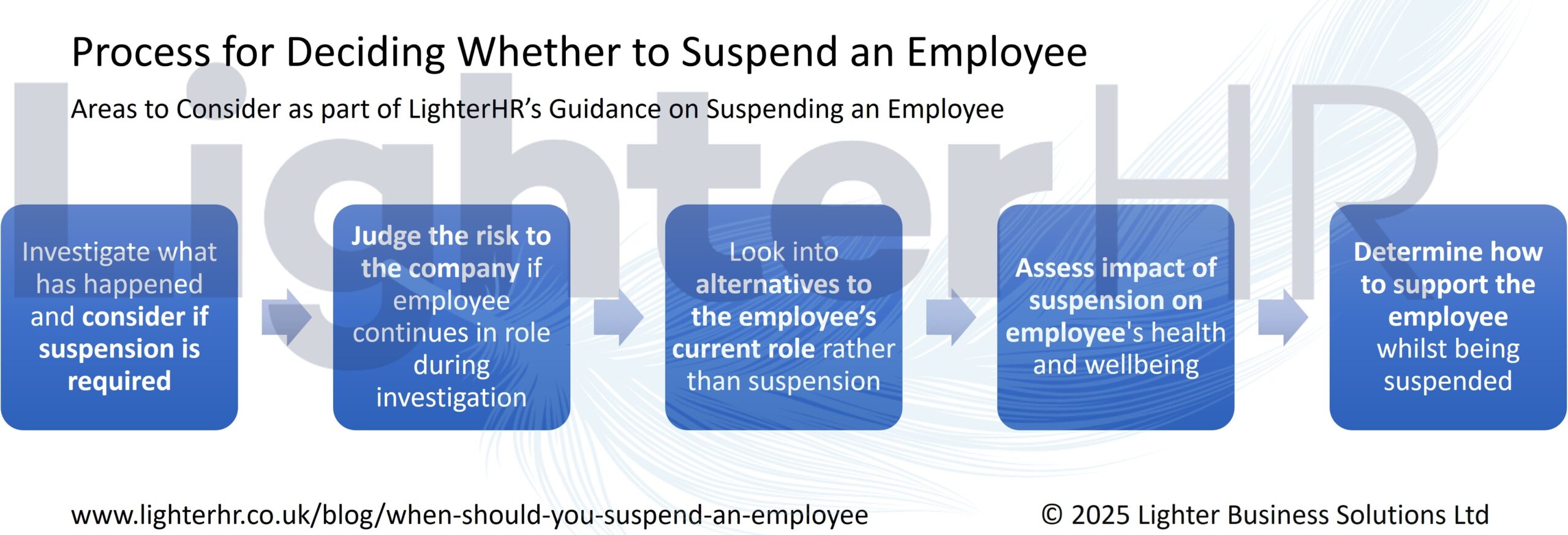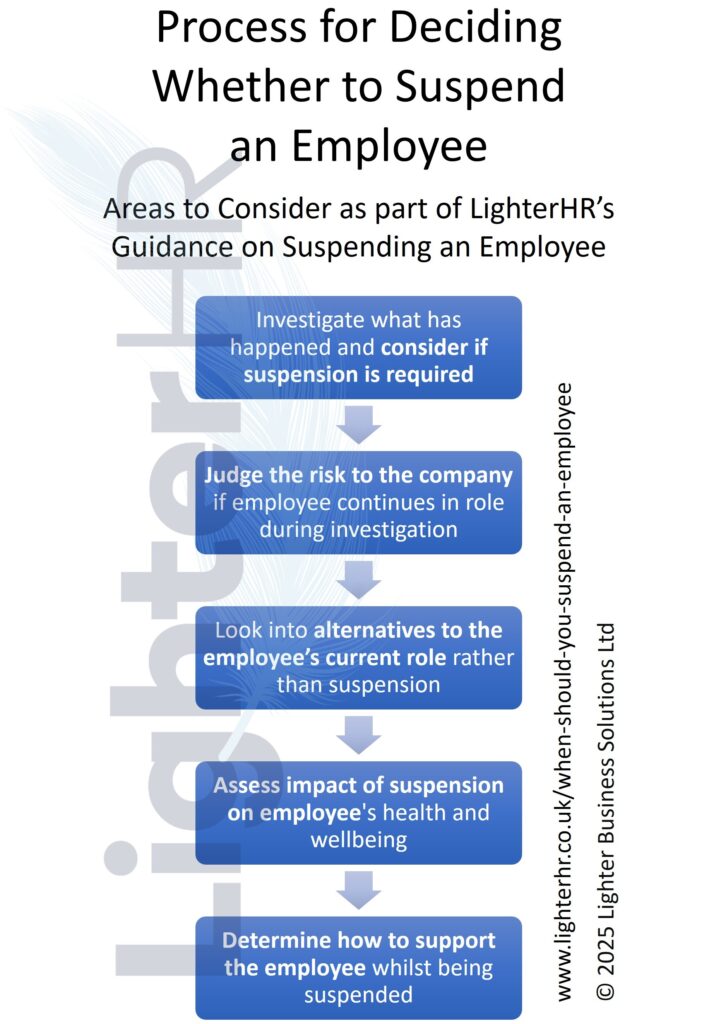Suspending an employee used to be the first action that an employer took when they suspected gross misconduct. It was also very normal for employees to be suspended during redundancy consultation processes. But is this the right thing to do?
In this post, we’ll look at the current law on suspension and when you should and should not suspend an employee.
If you want more information about managing a disciplinary matter than we have a detailed guide that takes you through the disciplinary process.
1. Suspending an Employee – How It Used to Be
Historically, suspending an employee accused of a disciplinary offense didn’t typically pose a significant legal risk.
If an employment contract gave the employer the right to suspend during a disciplinary investigation then, as long as they continued to give the employee all of their normal contractual benefits (holiday accrual, salary payment) they were on a fairly safe legal footing.
However, this assumption started to be challenged. Employees presented cases claiming that their suspension breached the implied term of trust and confidence between them and their employer. It led to claims for breach of contract and, in some cases, claims of constructive dismissal.
Employees were successful with some of these cases. This created a new area of ambiguity for employers.
2. So, Can I Ever Suspend an Employee?
Ultimately, yes.
Suspension is still valid in certain circumstances. The key thing to remember is that suspension should not be an immediate reaction to a situation.
Do not suspend someone without asking some key questions first.
3. What Is the Process for Deciding Whether to Suspend an Employee?
Step 1: Investigate and Consider if Suspending an Employee Is Indeed Required
Whilst you clearly can’t conduct a full investigation into what has happened, you do need to sit with the employee against whom the allegation is being made and explain what they are being accused of doing and allow them to give an initial explanation.
The purpose of this conversation is to enable you to consider what has happened. This allows you to assess the risk the employee’s ongoing presence in the workplace presents.
As an example, Bob has hit Mike. Bob has worked with you for 25 years and you’ve never had any issues with him at all. You sit with Bob and ask him what happened. Bob explains that his wife has dementia and he’s been struggling to support her. He goes on to say that Mike had been saying rude things about his wife and he had snapped.
Step 2: Judge the Risk to the Company if the Employee Continues to Work During Investigation
When we talk about “risk to the company” this could take many different forms.
- It could be that the employee’s continued presence could pose a risk to other employees or clients.
- It could be that the employee’s continued presence could present a risk to the resources of the company. A situation where theft is suspected would be in this category.
- It could also be that you feel that there is a risk that the employee could interfere with an investigation. You may be concerned that they would influence witnesses or destroy evidence.
Answering yes to one or more of these questions could lead you to consider suspending the employee.
Thinking back to the Bob scenario, Bob has snapped once so he may do so again. The pressure that he is facing at home was a contributing factor and that has not resolved. It is possible that you would conclude that Bob does pose a risk to the company.
Step 3: Check Any Other Alternatives to Employee Suspension
This is the most vital question of all.
You should only suspend an employee if there is no alternative. Acas gives some useful guidance on alternatives that you should consider and these are:
- Change shifts
- Work in a different part of the organisation
- Work from home
- Work from a different office or offsite
- Stop doing part of their job
- Work with different customers or away from customers
- Stop using a specific system or tool
Thinking about Bob, if you are fearful that Bob may hit another employee and there is a way to have him in an isolated role then you could consider this. Similarly, if Bob could do his job from home then this would be a viable alternative.
Step 4: Assess the Impact on Suspension on Employee’s Health and Wellbeing
This one is slightly more difficult to assess. You should consider what you know about the individual and whether suspension is likely to have a detrimental impact on their health and wellbeing.
Some individuals will happily sit at home being paid without the situation causing them too much distress. Others will find the entire situation extremely difficult. Being excluded from their workplace will have a significant impact on their mental health.
You can only employ your best endeavours here and this is a consideration but not the only consideration.
Back to Bob again – he is dealing with stress at home so being there more may be very difficult for him. However, he may also be happy to have some extra time at home to support his wife.
Step 5: Look Into Support for the Employee During Suspension Whilst Process Is Ongoing
It’s very important to remember that you have an ongoing duty of care to suspended employees. You need to consider how you will support any employee you suspend.
You should consider how you will keep in touch with them, whether there are any additional support options available to them such as an Employee Assistance Programme and also ask them what support they have around them.
If you’ve gone through these questions and concluded that you do need to suspend an employee, then there are still some things that you should remember…
4. General Rules to Suspend an Employee
If you do need to suspend someone then there are some general rules you should follow:
- Keep the suspension as short as possible – if you suspend someone then it is important that you move promptly with your investigation. You can then bring the matter to an end swiftly.
- Put everything in writing – you should send a letter to the employee confirming their suspension, explaining its implications, and assuring them they will receive their pay. You should also confirm in writing the steps that you went through before making the decision to suspend.
- Keep in touch with the individual – you should ensure you have a way to reach the individual whilst they are suspended. You should keep them updated with the progress of the investigation, particularly if you encounter any delays.
- Keep it confidential – it’s important that as few people as possible are aware that an employee has been suspended. The message to colleagues should be that the individual has needed to take some time off.
Again, the Acas guide has great information on what you should confirm to the employee.
Want to Know More?
If you are considering suspending an employee we encourage you to seek professional advice and we’d be happy to support you.
If you’d like any guidance on disciplinaries, whether including suspension or not, give us a call on 0203 535 5750 or contact us using the contact form.





